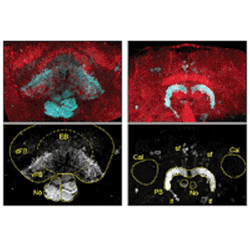Hegða eineggja tvíburar sér eins?
Ben de Bivort við Harvard háskóla tilheyrir hópri ungra vísindamanna sem eru að takast á við þessar spurningar. Hann notar hugmyndir þróunarfræðinnar og aðferðir sameindalíffræði og gerir tilraunir á ávaxtaflugum.
Ben mun halda erindi við Háskóla Íslands föstudaginn 3. júli (kl. 12:30 í stofu 131 í Öskju – náttúrufræðahúsi HÍ – aðgangur ókeypis og öllum heimill).
Hér fylgir titil erindis hans og stutt ágrip á ensku.
Ben de Bivort will talk about Genetic and neural circuit control of behavioral individuality
de Bivort works in the Department of Organismic and Evolutionary Biology and at the Center for
Brain Science at Harvard University.
Brief overview of de Bivort lab focus and work:
The animal kingdom contains staggering morphological diversity, but even greater variety is manifest in animal behavior. All animals display species-specific ecological behaviors (such as preferentially interacting with members of the same species), and behavior alone can distinguish species that are otherwise morphologically identical.
Moreover, evolution and behavior exert reciprocal influences on each other – while evolution can diversify behavior, behavior can constrain the evolution of species. For example, in sympatric speciation, behavior provides the reproductive barrier between sub-populations whose hybrid offspring have reduced fitness.
The goal of the de Bivort lab is to understand the neurobiological mechanisms of ecologically and evolutionarily relevant behaviors using techniques drawn from circuit-driven neuroscience, comparative genomics, and ethology, as they are manifested in fruit flies from the genus Drosophila.
The key questions being addressed.
What underlies the behavioral differences between genetically identical individuals?
What genetic changes underly the evolved differences in behavior between related strains and species?
Behavioral individuality reveals genetic control of phenotypic variability. PDF
